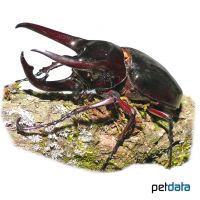Caucasus Beetle (Chalcosoma chiron)
| Caucasus Beetle Chalcosoma chiron | |
|---|---|
| Name | Caucasus Beetle |
| Name Lat. | Chalcosoma chiron |
| Synonym | Chalcosoma caucasus |
| Family | Scarab Beetles |
| Family lat. | Scarabaeidae |
| Order | Beetles |
| Order lat. | Coleoptera |
| Origin | Southeast Asia |
| Habitat | Deciduous forest |
| Diet | Bananas, fruits, beetle jelly |
| Humidity | 60-80 % |
| Behavior | Nocturnal, ♂ territorial |
| Keeping | Pair, harem |
| Care Level | Moderate |
| Housing | Semi-humid terrarium |
| Breeding | Moderately difficult |
| Life Span | 2-4 months |
| Protection | No |
| Metric Units | |
| Size | 5-13 cm |
| Temperature Day | 22-25 °C |
| Temperature Night | 18-22 °C |
| Housing Size | 50 x 30 x 40 cm |
| US Units | |
| Size | 2"-5" |
| Temperature Day | 72-77 °F |
| Temperature Night | 64-72 °F |
| Housing Size | 20" x 10" x 15" |
Distribution and habitat
Three-horned beetles are native to Southeast Asia, where they are especially common in Malaysia, Java, and Sumatra and live in deciduous forests with lots of dead wood. These nocturnal beetles are among the largest in Asia. As crop followers, they can also be found in palm plantations.
Maintenance
A terrarium of e.g. 50 x 30 x 40 cm (L x W x H) is recommended. A hinged lid terrarium or an aquarium with a tightly closing lid made of the finest gauze is best suited. The terrarium should be placed in a quiet place without direct sunlight.
The substrate, at least 15-20 cm deep, should consist of a slightly moist deciduous forest or terrarium humus mixed with a little white rotted wood, with the bottom layer (about 5 cm) well compacted. On top of this Flake Soil and/or some foliage for cover (shelter and hiding places), some branches for climbing and erection, and pieces of bark or moss cushions to maintain humidity.
At least once a week the terrarium should be finely sprayed inside (humidity), waterlogging and mold is to be avoided at all costs.
| Temp. day: 22-25 °C | Temp. night: 18-22 °C | Humidity: 60-80 |
The lighting duration should be 8-10 hrs. Daylight fluorescent tubes supplemented with spotlights that generate the necessary heat are ideal.
Diet
The food for adult beetles (imagines) consists of fruit, especially suitable are overripe bananas and mangos, maple syrup and Beetle Jelly. With fruit and maple syrup they cover their liquid needs. Citrus fruits are not suitable.
Larvae feed on deciduous forest humus and white rotted wood, shredded as finely as possible for better absorption, or Flake Soil (fermented wood substrate). Moderate supplemental feeding of stream fleas or silkworms will promote growth
A regular and varied diet promotes health and prevents deficiency symptoms.
Reproduction and breeding
The males are much larger than the females and easily recognized by their distinctive horns.
After mating, the female buries herself in the soil substrate and lays up to 70 eggs there
The generation time is 13-18 months depending on the temperature, but the male larvae develop much slower.
The life expectancy of the imagines can be 2-4 months.
Important
Chalcosoma caucasus are very similar to Chalcosoma atlas, which have a broader head horn.
Males are incompatible with each other. Therefore, they should be kept only in pairs or in a harem, one male with several females. When disturbed, they make stridulation sounds with their abdomen and mating wings.
It is important to have a certain amount of moisture in the food, because the animals only take in the required liquid through their food.
A sufficiently deep substrate is essential, as the substrate is both food and habitat for the larvae. A regular substrate exchange is necessary, whereby the intervals can be several months depending on the stocking.
The terrarium must have good ventilation without drafts and must meet the species-specific needs. Measuring devices such as thermometers, hygrometers, etc. are necessary. The lighting has to correspond to the species-specific day-night rhythm and has to be placed in such a way that the animals cannot injure themselves. The terrarium should be locked in such a way that neither unauthorized persons can open it nor the animals can escape. Contamination must be removed regularly
Further literature can be found in your pet store.
References
Text: petdata; Image: petdata
Source: HENKEL & SCHMIDT (2010): Taschenatlas Wirbellose für das Terrarium, Ulmer Verlag; ENGELMAN & LANGE (2011): Zootierhaltung - Tiere in menschlicher Obhut: Wirbellose, Verlag Harri Deutsch
